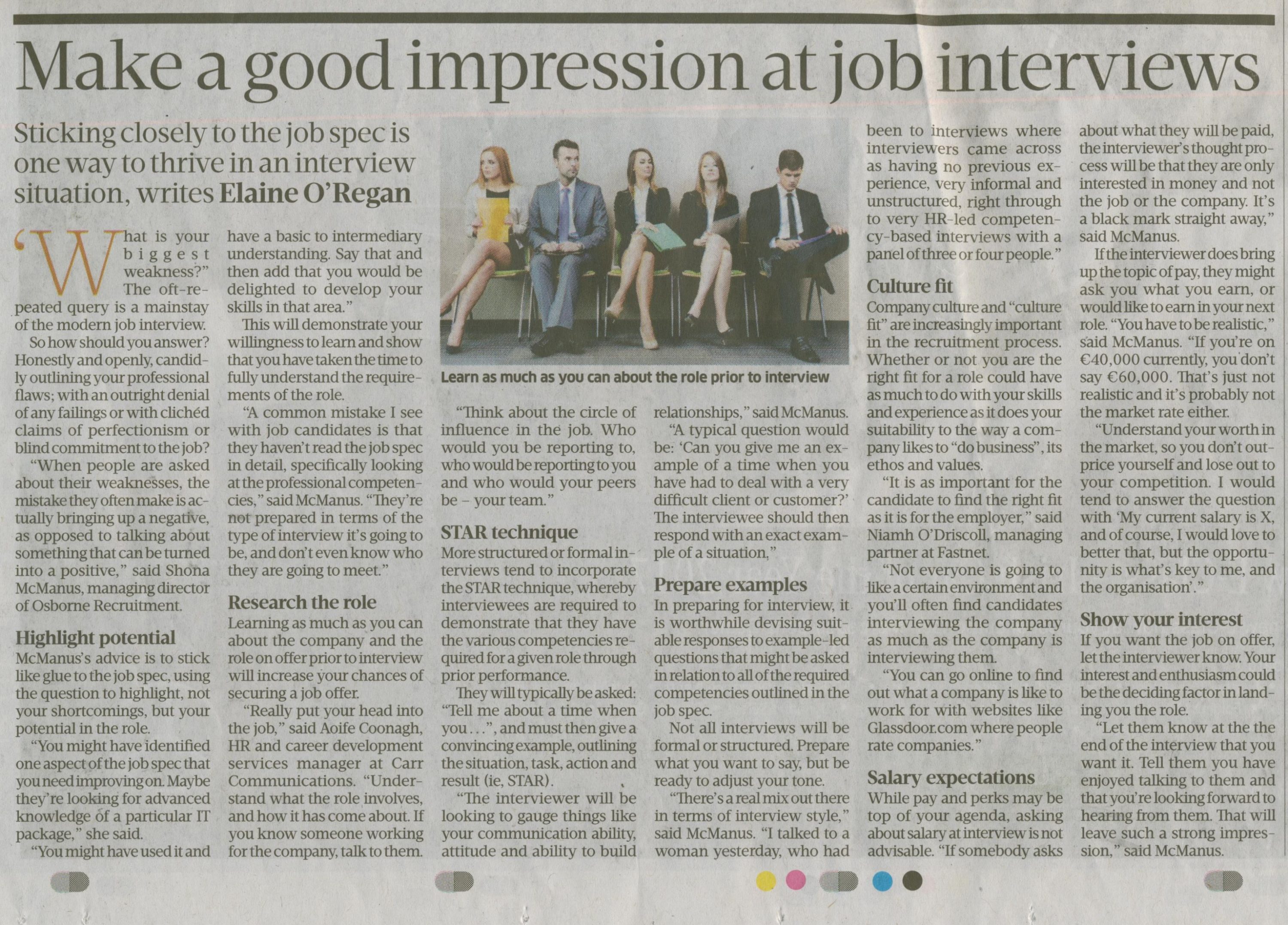Making a Good Impression at Job Interviews
27 July 2024
This Osborne article on what to do at your next job interview, featuring advice by Osborne CEO Shona McManus, was recently published in the Sunday Business Post.

Sticking closely to the job spec is one way to thrive in an interview situation, writes Elaine O’Regan
What is your biggest weakness? The often repeated query is a mainstay of the modern job interview. So how should you answer? Honestly and openly, candidly outlining your professional flaws; with an outright denial of any failings or which clichéd claims of perfectionism or blind commitment to the job? “When people are asked about their weaknesses, the mistake they often make is actually bribing up a negative, as opposed to talking about something that can be turned in to a positive,” said Shona McManus, managing director of Osborne Recruitment.
Highlight Potential
McManus’s advice is to stick like glue to the job spec, using the question, to highlight, not your shortcomings, but your potential int he role, “You might have identified once aspect of the job spec that you need improving on. Maybe they’re looking for advanced knowledge of a particular IT package,” she said. “You might have used it and have a basic to intermediary understanding. say that and then add that you would be delighted to develop your skills int his area.” This will demonstrate your willingness to learn and show that you have taken the time to fully understand the requirements of the role. “A common mistake I see with job candidates is that they haven’t read the job spec in detail, specifically looking at the professional competencies,” said McManus. “They’re not prepared in terms of the type of interview it’s going to be, and don’t even know who they are going to meet.”
Research The Role
Learning as much as you can about the company and the role on offer prior to the interview will increase your chances of securing the job offer, “Really out your head in to the job,” said Aoife Cooney HR and career development services manager at Carr Communications. “Understand what the role involves, and how it has come about. If you know someone working for the company, talk to them. “Think about the circle of influence in the job. Who would you be reporting to, who would be reporting to you and who would your peers be – your team.”
STAR Technique
More structured or formal interviews tend to incorporate the STAR technique, whereby interviewees are required to to demonstrate that they have the various competencies required for a given role through prior performance. They will typically be asked: ” Tell me about a time when you ….”, and must then give a convincing example, outlining the situation, task, action and result (i.e STAR). “The interviewer will be looking will be looking to gauge things like your communication ability, attitude and ability to build relationships,” said McManus. ” A typical question would be; ‘Can you give me an example of a time when you had to deal with a very difficult client or customer?’ The interviewee should then respond with an exact example of a situation.”
Prepare Examples
In preparing for interview, it is worthwhile devising suitable responses to example – led questions that might be asked in relation to all of the required competencies outlined in the job spec. Not all the interviews will be formal or structured. Prepare what you want to say, but be ready to adjust your tone. “There’s a real mix out there in terms of interview style,” said McManus. “I talked to a woman yesterday, who had been to interviews where interviewees came across as having no previews experience, very informal and unstructured, right through to very HR led competency based interviews with a panel of three or four people.”
Culture Fit
Company culture and “culture fit” are increasingly important in the recruitment process. Whether of not you are the right fit for a role could have as much to do with your skills and experiences it does your suitability the way a company likes to do business, its ethos and values. “It is important for the candidate to find the right fit as it is for an employer,” said Niamh O’Driscoll, managing partner at Fastnet. “Not everyone is going to like a certain environment and you’ll often find candidates interviewing in the company as much as the company is interviewing them. “You can go online to find out what a company is like to work for with websites such as glass door.com where people rate companies.
Salary Expectations
While pay and perks may be top of your agenda,asking about salary at interview is not advisable. “If somebody asks about what they will be paid, the interviewer’s though process will be that they are only interested in money and not the job or the company. It’s a black mark straight away,” said McManus If the interviewer does bring up the topic of pay, they might ask you what you earn, or would like to earn in your next role. “You have to be realistic,” said McManus. “If you’re on €40,000 currently, you don’t just say €60,000. That is just not realistic and not the market rate either.” “Understand your worth in the market, so you don’t out price yourself and loose out to your competition. I would tend to answer the question with ‘My current salary’s X. and of course, I would love better than that, but the opportunity is what is key to me, and the organisation’.”
Show your interest
If you want the job offer, let the interviewer know. your interest and enthusiasm could be the deciding factor in landing you the role. “Let them know at the end of the interview that you want it. Tell them you have enjoyed talking to them and you are looking forward to hearing form them. That will leave such a strong impression.” said McManus.



